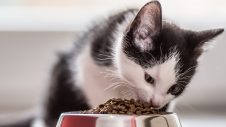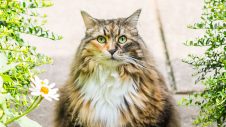 It can be difficult for cat parents to know whether their cat has a weight problem. Dr Veronica Monaghan from Greencross Vets Kedron talks about
It can be difficult for cat parents to know whether their cat has a weight problem. Dr Veronica Monaghan from Greencross Vets Kedron talks about
the problems with overfeeding.
How much should you feed your cat?
If your cat is new to your household, you should begin by using the cat food packet as a guide. The amount is often described by the cat’s age and weight.
Different animals often have different requirements depending on their lifestyle and other factors, so you cannot rely on this guide alone.
If your cat is starting to put on weight, it’s important to reassess how much they’re eating. Likewise, if they’re losing weight, you may need to increase their amount of food. If you’ve had your cat for a long time, it’s about feeding them a certain amount and observing. If you’re unsure, consulting your vet about the best diet for your cat’s needs.
Consequences of regular overfeeding
Cats will get fatter if they’re regularly overfed. This means they get less mobile, more lethargic, less active, and can eventually get sick. Obese cats can get liver or heart disease, or diabetes. In our clinic, we see some families who have more than one diabetic cat, because that family tends to overfeed their pets. Overfeeding is easily preventable.
Long-term consequences
Regular, long-term overfeeding can lead to death. Diabetes needs to be managed a certain way, and if a diabetic cat is continually overfed, they won’t live as long as it should. Liver disease, pancreatitis, and other health issues can also take a toll on an animal’s lifespan.
How to know if you’re overfeeding
It can be difficult to check if a cat is overweight. The best way is to put your hands on your cat and feel the fat on their body. You should still be able to easily feel bones and flesh underneath. For cats with lots of fur, you can’t just go by how they look, because the fur conceals body size.
Greencross Vets have also developed this infographic to help cat parents test if their cat is overweight.
Fixing the problem
Carefully look at how much your cat is eating. This includes treats. Set aside their daily portion of food and take treats or rewards from this portion – that way, when it comes to their main meal, they won’t be getting fed excess calories.
Exercise is important
Playing is hugely important for cats in terms of health benefits. Cats need daily activity to stay fit and burn fat, just like humans. Playing is also beneficial to their mental health. Bored cats often display behaviour issues, so mental stimulation is important to their wellbeing. In the wild, cats would spend a lot of their day stalking food. Pouncing is an important natural instinct for cats. Interactive feeding bowls are a great way to stimulate your cat’s hunting instincts when it comes to food time.
Contact your local Greencross Vets to set up an appointment for a weight and nutrition assessment for your pet.

 Greencross Vets
Greencross Vets 





